
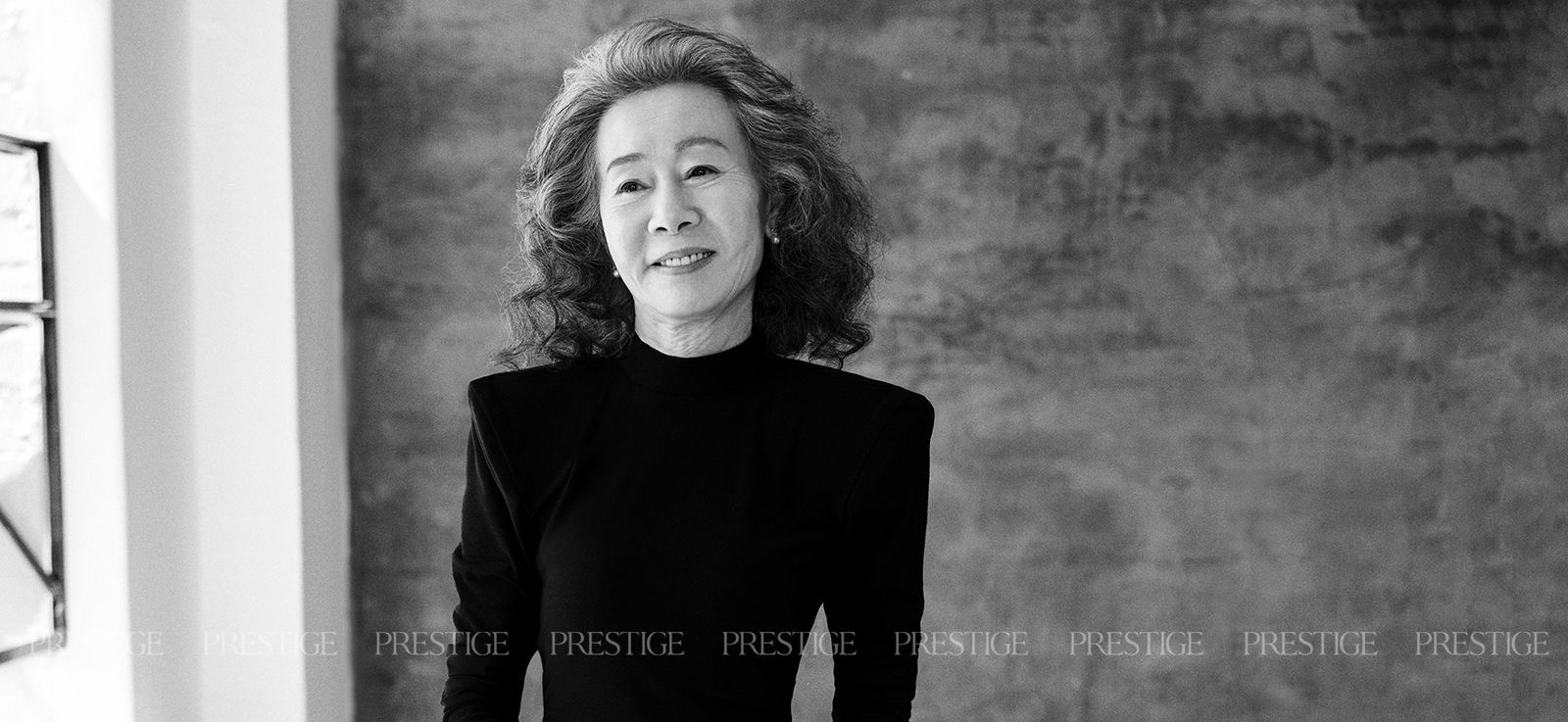
South Korean Oscar-winner Youn Yuh-Jung, whose career spans more than five decades, was never a typical actress – or woman. The veteran performer talks about her latest role in the Apple TV+ epic drama Pachinko, and a lifetime of trailblazing.

YOUN AT HEART
For the better part of her decades-long career, Korean actress Youn Yuh-Jung played roles that no actress of her generation dared even approach. She purposely avoided “stereotypical mothers-in-law and mothers you’d see in popular Korean dramas” to explore more complex females and, she admits, “to not be bored”. Instead, she played uninhibited femme fatales and independent matriarchs who defied gender roles and societal norms.
“When I first came to this country [Japan], we had so little money. We lived in Osaka and I remember walking by the food stalls near the train station and trying to imagine what each dish tasted like,” recounts the story’s 74-year-old Sunja protagonist, whom Youn plays in her older years, in a scene from the third chapter of Apple TV+ new drama series Pachinko. Sitting at a small kitchen table in late-1980s Japan, she goes on to celebrate the nuttiness and superiority of Korean rice, a rare find in the country.
The eight-part series, which is based on the bestselling novel of the same name by Min Jin Lee, is an epic multi-generational saga that chronicles Sunja and her family’s journey over seven decades, from the Japanese occupation of Korea in the 1910s to their life as immigrants in Japan. As Zainichi, or “Koreans in Japan”, they experienced racism and discrimination.

“When I first got the script I felt an immediate connection to Sunja – I was inspired by her, by her strength and determination to survive,” Youn tells us. “I experienced the same emotions through my mother. Sunja actually is around my mother’s age, they lived through the same period, when Korea was occupied by Japan… When a country is ruled by another one, anything can happen. Somehow I felt as if I needed to play this role.”
Set against the backdrop of a painful chapter in Korean history, Sunja’s life is a universal tale of resilience and adaptability, which Youn can relate to in multiple ways. Born in 1947 in Kaesong, now in North Korea, she escaped to Seoul with her family soon after, when the communist regime was taking over that part of the peninsula.
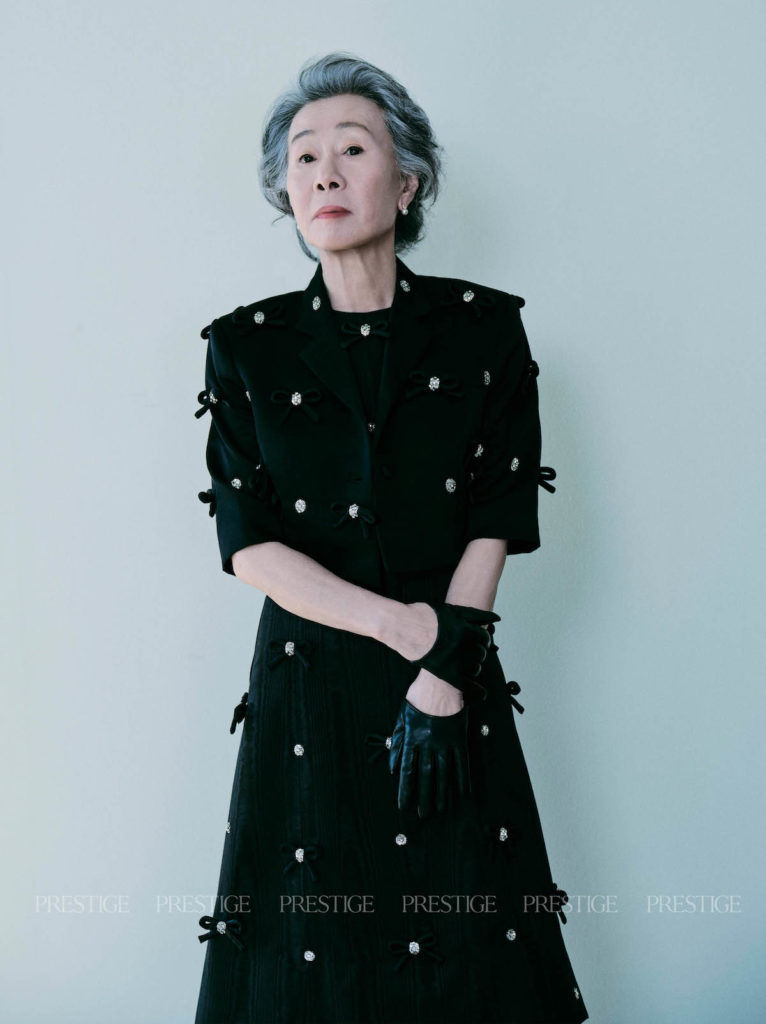
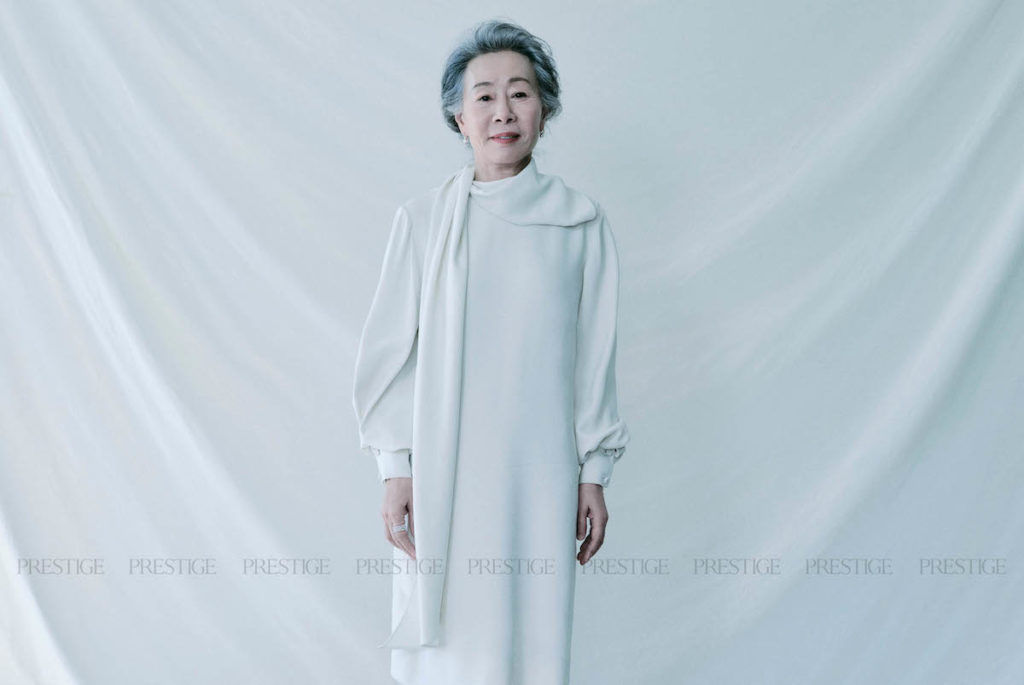
“Before the war, my family was quite affluent, because of ginseng farming, but we lost everything once we got to Seoul and became refugees. We had nothing,” she recalls. “My father died when I was nine or 10. My mother was so strong. A tough lady!”
In cinema and life, what stands out the most about Youn is her forthrightness, a trait most people wouldn’t necessarily associate with a 74-year-old grandmother. Rather than dispensing advice and morality, she radiates effortless peacefulness and confidence – but never arrogance.
“Life is all about choices,” she says. “I admire Sunja because, when she gets pregnant in the 1930s by a man she didn’t know was married, she doesn’t accept his financial help and the chance to live a comfortable life. It made me think of myself – maybe I would have chosen a comfortable life,” Youn says jokingly.
Over the past decades, Youn earned the right always to be herself, both as an actress and a woman. “I made all my choices following my heart, so it’s my responsibility to live with them,” she tells us as we discuss the monumental impact of her career and the – often harsh – criticism she faced to get where she is.
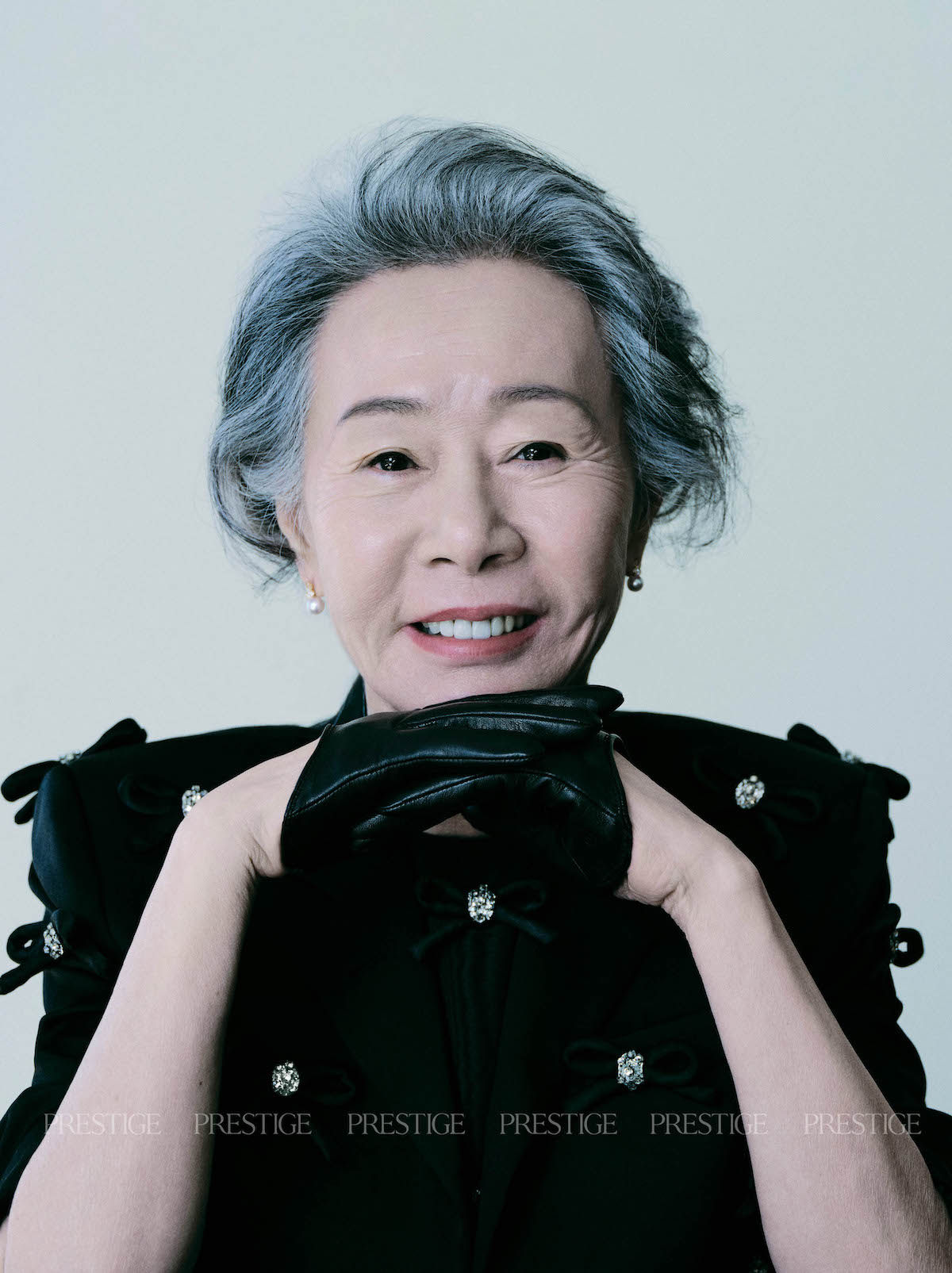
Long before she became a household name, Youn made it clear that she wasn’t going to settle for the usual “poor-girl-meets-rich-boy” kind of stories. Instead, soon after gaining prominence playing a royal concubine on TV, she started working with filmmaker Kim Ki-young, whose works ambitiously analyse human nature and focus on the psychology of atypical female characters.
“As I think of those roles, like my performance in Woman of Fire in 1971, I wonder if I was very brave or just ignorant, as I didn’t care about what critics and people thought,” she says. “When I was a young rising star, I got a lot of scripts from different directors and producers. Woman of Fire’s script didn’t employ the usual, boring tropes to tell the story. I was 22 or 23, I picked it because it was different … or I don’t know why, I just did!”
Koreans love dramas. They’re very emotional, which is why we’ve always produced so much content
Youn Yuh-Jung
Years later, when Youn starred in the 2003 internationally acclaimed drama A Good Lawyer’s Wife, directed by Im Sang-soo, “people were shocked. They thought the character was way too liberal. Women of my generation still didn’t want those parts,” she says. “I had to be half-naked. It was way too much for Korean society.”
In some ways, South Korea has remained the same. However, when it comes to the public’s perception of “popular arts”, like acting and singing, Youn tells us, things have changed. “In the past, acting was looked down upon when compared to fine arts,” she says. “But movies and dramas touch so many people nowadays that it’s not like that any more.”
“Even my mother, before passing away two years ago, was proud of me,” she continues. “As Korea has always been a very conservative society, when I was young she was ashamed of me, because I didn’t get into good universities. When I was older, she would always praise people with PhDs and good degrees. At the end of her life, however, she used to say I had a PhD in acting.”
As it turns out, as a teenager, Youn had to choose between focusing on her studies to get into a prestigious university, or finding a part-time job to help her single mother. “It wasn’t really a matter of choosing not to study hard, I was just thinking of ways to help my mother.”
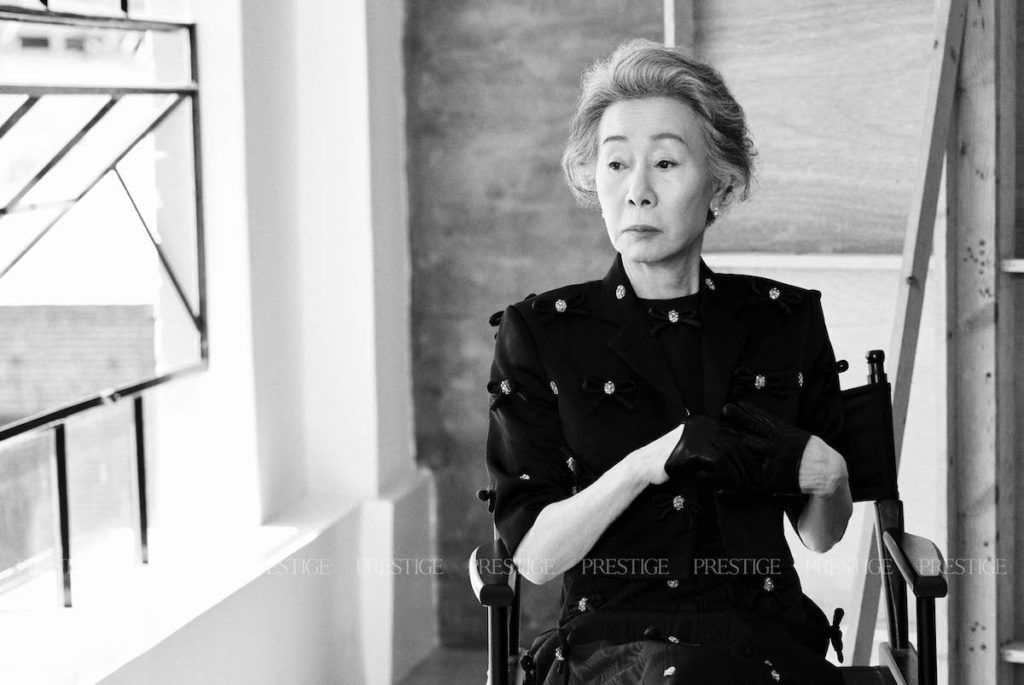
In 1974, she took a break from acting and moved to Florida with her then fiancé Jo Young-nam, a popular South Korean singer who relocated to the US to study theology. “We were living near Tampa. It was wild, with many people from different backgrounds, but mostly Southerners who went to church. They were all nice,” she recalls. “The congregation was made up of 2,000 people, but there were only two Koreans, my husband and I. Fortunately, I didn’t face any discrimination, maybe because I didn’t frequent certain environments.”
It was when her marriage to Jo eventually ended – it culminated in a public divorce in South Korea – that Youn learned just how much public attention and scrutiny her private life would be subject to. Upon her return to the country, in the 1980s, as a single mother, she soon found out that while the economic boom had changed some aspects of society, it hadn’t impacted its traditionalism and patriarchal views.
“I felt quite sorry for my children, because I was working all the time. In Korea, we often talk about the ‘power of rice’, an exact translation that refers to mothers cooking for the family to show their affection,” she says. “My sons didn’t have that kind of experience, because I was working all the time to support them. Later on, when I apologised to my boys for not providing home- cooked meals, my son said to me, ‘Don’t worry, that’s why we’re skinny’,” Youn recalls, laughing.
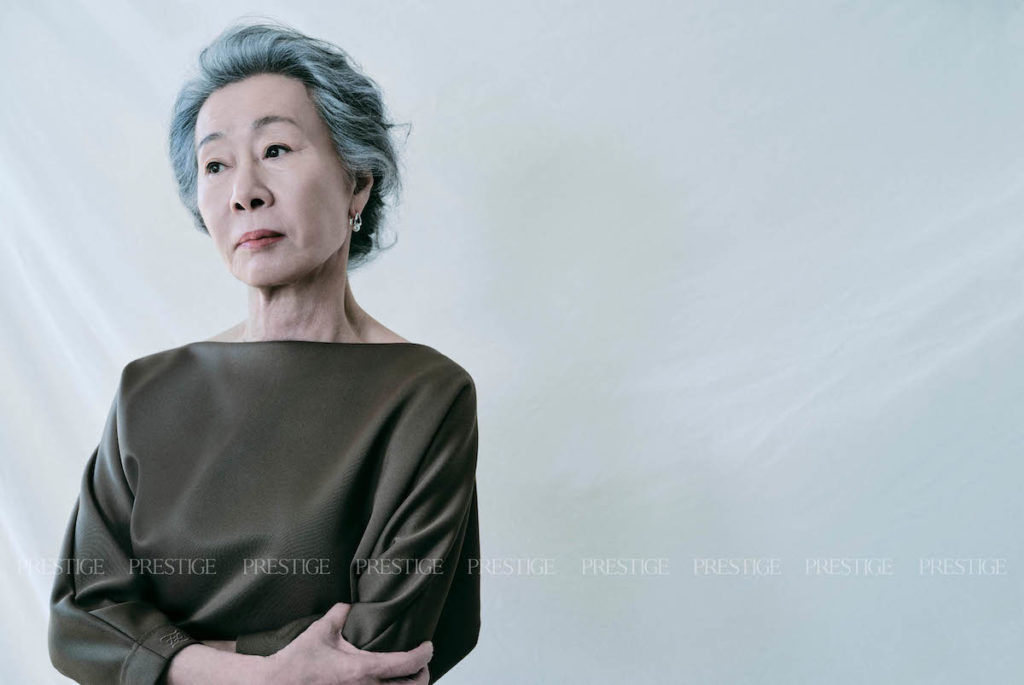
While her prolific and multifaceted career continued to blossom at home and internationally on the avant-garde film-festivals circuit, the rest of the world slowly but steadily became fascinated by South Korean entertainment. The so-called Hallyu 2.0 – new “Korean wave” – catapulted an increasing number of Korean dramas, movies and K-pop artists into the mainstream global arena.
“Koreans love dramas. They’re very emotional, which is why we’ve always produced so much content,” Youn explains. “All of a sudden, people started paying so much attention to South Korean entertainment, maybe even more so in the past few years, thanks to Bong Joon-ho. The Oscars had always been for westerners, for Hollywood people. Things then changed. Bong knocked on the door and they opened.”
Bong’s 2019 black comedy Parasite made Oscar history by becoming the first non-English-language film to ever win Best Picture. Then last year, Youn set a record of her own when she became the first South Korean actress to receive a coveted golden statuette for her performance in Minari.
“We used to watch the Academy Awards on TV from the other side of the world. I never thought of pursuing an award while shooting a movie,” she says “When I won last year, everyone was shocked and I was too. I’m honoured but it’s sad it took such a long time for this to happen.”
She treasures the opportunity to work with various people. “Winning an Oscar hasn’t changed my life and career. I only get more phone calls,” she jokes.
When Time magazine chose her as one of the 100 Most Influential People in the World in 2021, Youn was more appreciative of what Steven Yuen, her co-star in Minari, had written about her than the accolade itself. “It was so interesting to read what Steven said about me. I only saw him for six weeks during the shooting of Minari,” she says. “I was so impressed and touched by his words. He’s younger than my youngest son. That meant more than being included in the list, I don’t care about lists.”
In his brief ode to Youn, Yuen praised her innate ability to be an “imperfectly perfect human”, rather than a star or a celebrated actress. It’s a quality that especially shines through in one of her latest projects, the reality TV Youn’s Kitchen. Needless to say, Youn isn’t your average reality-TV star and nor is Kitchen your average, hyper-dramatic cooking show. The successful format follows South Korean celebrities as they run a pop-up restaurant in a foreign country, where most likely they aren’t well known.
“At first, when I was asked to do it, I said no. I’m a private person and I didn’t want to do a reality show,” Youn says. “The producer chased me for a while, but I wasn’t sure. One day, I asked him, ‘How old are you?’ because in Korea you’re supposed to show respect to the elderly. I found out he was younger than my youngest son. He worked so hard to have me in the show that it moved me. So I decided to do it.”
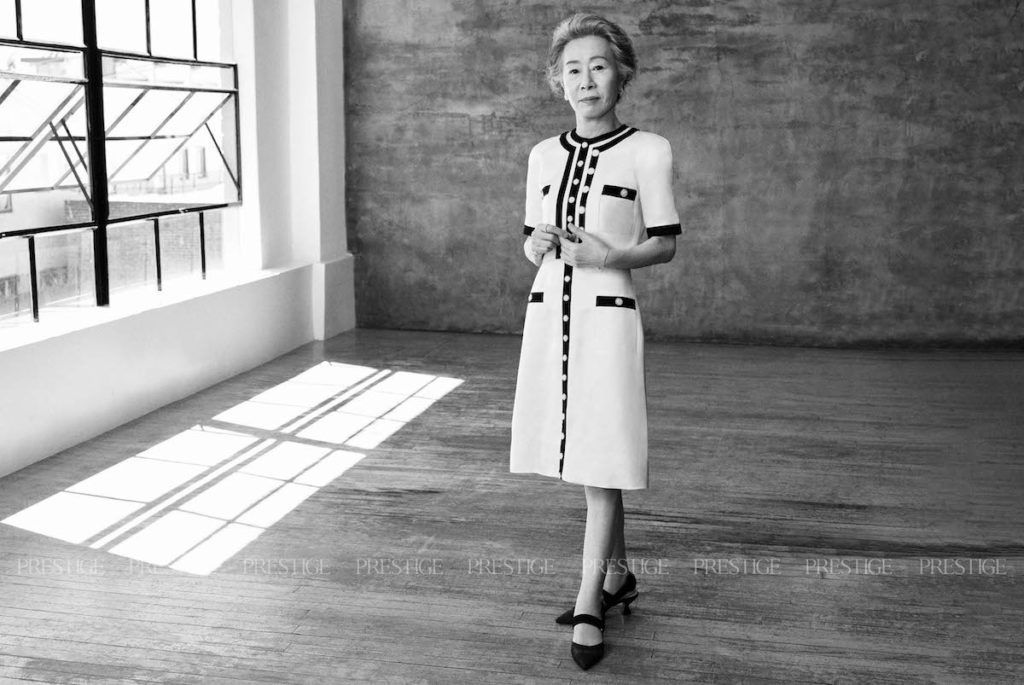
Towards the end of our conversation, we talk about her forthcoming 75th birthday, this June. As time passes, Youn tells us, she no longer cares about celebrating birthdays. Even if “it’s totally natural and OK to get old, it just makes daily activities increasingly uncomfortable”.
When we ask if she has any advice for emerging actors, she tells us she doesn’t know what to say, except:
“I’m just an actress who chooses to play different parts.”
“Sometimes I think that because English isn’t my first language, I can’t express myself with many words, but my best friend said I do the same thing in Korean.”
“Short and sweet,” we say.
“Short and sour, in my case,” she says, laughing.
YOUN YUH-JUNG COVER STORY
Words Marta Colombo
Creative direction, styling and interview Alvin Goh
Photography Dennis Leupold at Monday Artists
Make-up and hair styling Jenny Oh
1st Assistant Charles Brown
Digital tech Kevin Leupold
Production Sacha De Bona at Monday Artists
Tailor Martin Zepeda
Assistants Michelle Goh and Jinn Ong
This story first appeared on Prestige Hong Kong.
The post Korean actress Youn Yuh-Jung on her role in “Pachinko” and being a trailblazer appeared first on Prestige Online – Singapore.

